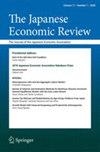具有转换成本的混合双寡头垄断
IF 0.5
4区 经济学
Q2 ECONOMICS
引用次数: 1
摘要
在利润最大化的私营企业与福利最大化的上市企业竞争的两期hotelling模型中,我们考察了转换成本的影响。我们表明,在两家公司都是私营企业的情况下,转换成本在两个时期都提高了价格,而在混合双寡头垄断的情况下,他们在第二个时期提高了价格,但在第一个时期降低了价格。此外,第一阶段的降价幅度如此之大,以至于转换成本降低了企业的利润,提高了消费者的福利。我们还发现,转换成本对私有化的影响有利于企业,不利于消费者。本文章由计算机程序翻译,如有差异,请以英文原文为准。
A Mixed Duopoly With Switching Costs
We examine the effects of switching costs in a two-period Hotelling-type model where a profit-maximising private firm competes with a welfare-maximising public firm. We show that, in contrast with the case in which both firms are private, where switching costs raise prices in both periods, in the mixed duopoly they raise prices in the second period but reduce them in the first period. Moreover, the first-period price reduction is of such magnitude that switching costs reduce firms’ profits and raise consumer welfare. We also find that switching costs affect the consequences of privatisation in favour of firms and against consumers.
求助全文
通过发布文献求助,成功后即可免费获取论文全文。
去求助
来源期刊

Japanese Economic Review
ECONOMICS-
CiteScore
2.70
自引率
0.00%
发文量
15
期刊介绍:
Started in 1950 by a group of leading Japanese economists under the title The Economic Studies Quarterly, the journal became the official publication of the Japanese Economic Association in 1959. As its successor, The Japanese Economic Review has become the Japanese counterpart of The American Economic Review, publishing substantial economic analysis of the highest quality across the whole field of economics from researchers both within and outside Japan. It also welcomes innovative and thought-provoking contributions with strong relevance to real economic issues, whether political, theoretical or policy-oriented.
 求助内容:
求助内容: 应助结果提醒方式:
应助结果提醒方式:


